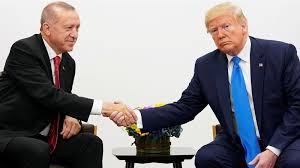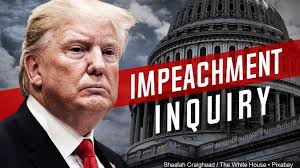by Prasad Nallapati
President Trump is widely condemned for his seemingly haphazard decision to withdraw from northern Syria to allow a Turkish invasion into the area to clean it off the Kurdish People’s Protection Units, known as YPG. The latter was an ally of the US in their fight against the Islamic State terrorist group and hence the move was abhorred as `back-stabbing’. Gathering momentum for his impeachment over another foreign policy bluster in dealing with Ukraine has given additional ammunition to his critics in the US and abroad.
Let’s have an honest look at it!
It was true that the decision was `abrupt’ and `rustic’ as have been many of his other foreign and domestic policies. But he was elected precisely for these characteristics and continues to enjoy popularity in his political base camp.
The American policy on Syria under President Trump has in fact been a continuation of the direction set by the previous Obama administration, who himself was elected on his promise to pull the US out of “costly military wars” around the world.
Obama had initially got carried away by Saudi and Turkish initiatives for a quick regime change and install a democratic rule in Syria, but soon withdrawn from the project as he realized that they were only creating and strengthening terrorist forces of the Islamic State and Al Qaida.
He was only too happy for Russians to take control of the situation and the two countries coordinated militarily and diplomatically to defeat terrorist forces. The US alliance with “heroic” Kurdish forces of the YPG in the north has proven to be decisive in ousting the Islamic State. Russian support to Syrian forces and Iranian militia consolidated President Assad’s control over much of the country by rooting out the opposition and terrorist forces.
As Russia, backed by the US, is moving toward a constitutional process to bring peace to Syria, they are forced to deal with political interests and security concerns of their mutually antagonistic allies.
Among the external forces, President Erdogan of Turkey is the most demanding in securing its national interests, as he sees them. Having been thwarted by both the US and Russia from his dreams of capturing strong foothold on Damascus, he trained all his arms to influence Trump to prevent the Kurds to consolidate their gains close to the border with Turkey.
Erdogan accused the YPG as an extension of the PKK (Kurdish Workers’ Party), which is considered as a terrorist organization by Turkey, the US, UN and the EU. With PKK holding a sway over parts of southern Turkey, the YPG control over northern Syria would have serious security implications for Ankara. Although YPG is a crucial ally in the fight against Islamist State, their demand for a territorial autonomy has no takers. The US, Russia and Iran have greater sympathy to Turkish concerns, but they would not allow any compromise on Syria’s territorial integrity.
President Trump’s offer of various options like joint security mechanism, involving demilitarized zone and joint patrols, in northern Syria to keep the YPG away from Turkish border did not satisfy either the Turks or Kurds, leaving him exasperated. This is the background in which Trump had his telephonic talk on October 6 with Erdogan and consented to the latter’s plan to march into northern Syria and push the YPG away from a zone of 32 kms depth from the border.
His decision the next day to withdraw American forces from the region was apparently coordinated with the Russians allowing the latter to swiftly move to take over the bases vacated by them. Despite his derisive characterization of the Kurds, like “they were not angels”, “they did not help us with Normandy…” etc, Trump remained in touch with YPG commander Mazloum Abdi and allowed them to reach an agreement with Russians and President Bashar al Assad to protect themselves against the invading Turkish forces.
A `cease-fire’ negotiated by Vice President Mike Pence with Erdogan has further placed limits to Turkish ambitions. Erdogan wants Kurdish fighters to leave the complete stretch of the border from the Euphrates river to Iraq, a length of 400 kms, where he proposes to resettle over a million Syrian refugees currently residing in Turkey. But the US seems to be prepared to allow Turkish forces to operate only in the central zone of 100 kms between the towns of Tal Abyad and Ras al-Ayn and to a depth of 32 kms.
In continuation of the American policy, Trump administration wanted Moscow to take the further lead to bring all the warring factions together and set the parameters for a peace process. Russian forces have taken over Manbij, vacated by the US, in the western sector and the road leading to Kobani. The Syrian government troops have entered Hasakah, Qamishi and Derik town centres in the eastern sector as part of an agreement with YPG, brokered by Russia.
There is thus a broad alignment of American and Russian objectives in Syria. Erdogan is meeting President Putin in Sochi today, the 22ndof October to discuss further action. Al-Monitorquoted Russian special envoy to Syria, Alexander Lavrentiev, outlining some of Moscow’s `red-lines’ for Turkish incursions into northern Syria. These include: “Territorial integrity” of the country cannot be breached, thereby suggesting that no permanent military presence can be established once Turkey’s security need is satisfied with Kurdish forces leaving the area; the Kurdish issue in the long run to be dealt as per Adana agreement, with any modifications that may be negotiated; and Refugees will not be welcomed to resettle in the region as the process of their resettlement needs to be separately negotiated under a national plan.
The US withdrawal from Syria, therefore, is very unlikely to materially alter the situation. Russia has long been in charge of the situation and has an unenviable task of bringing together multiple warring factions to an agreed constitutional process. Iran broadly follows Russian lead on Turkish incursions and there is nothing much for it to gain out of this episode. Israel is not happy with the American move, but it is not the first time that Trump is willing to dump the allies under his `America First’ policy.
(Prasad Nallpati is President of Hyderabad-based think. tank, the Centre for Asia-Africa Policy Research and former Additional Secretary to Govt of India)




